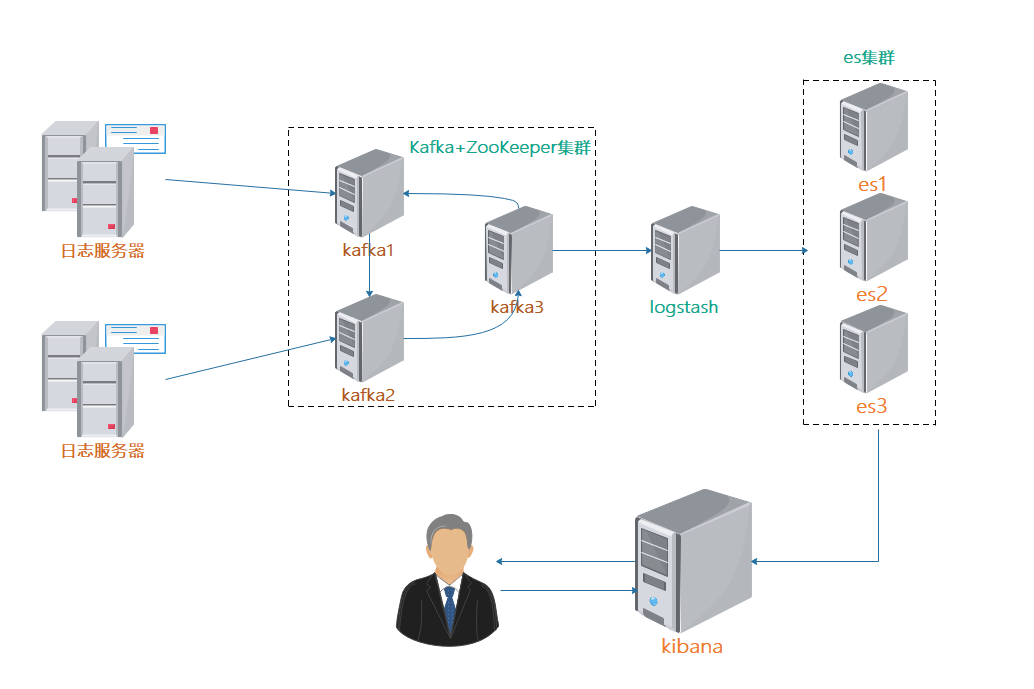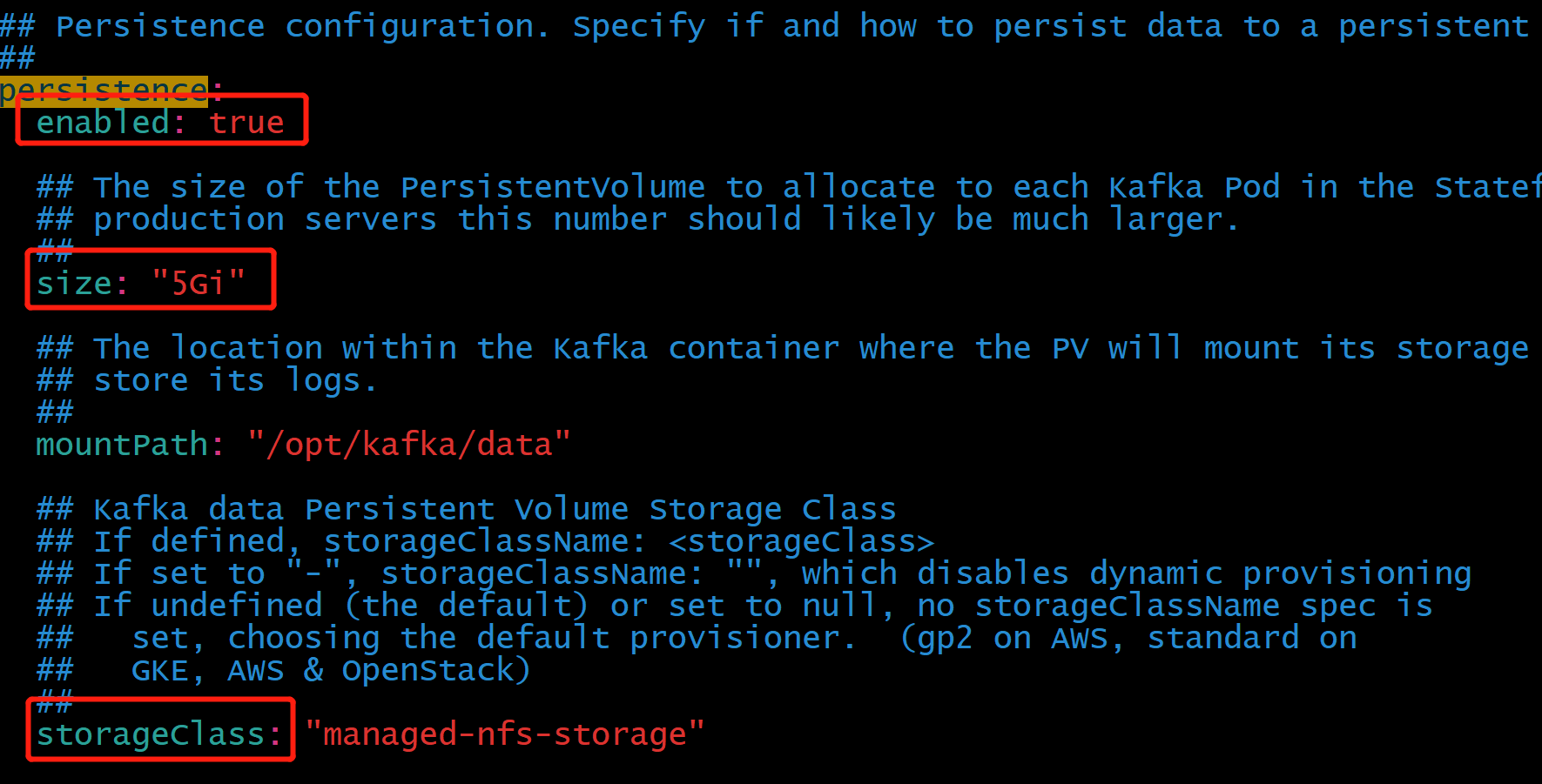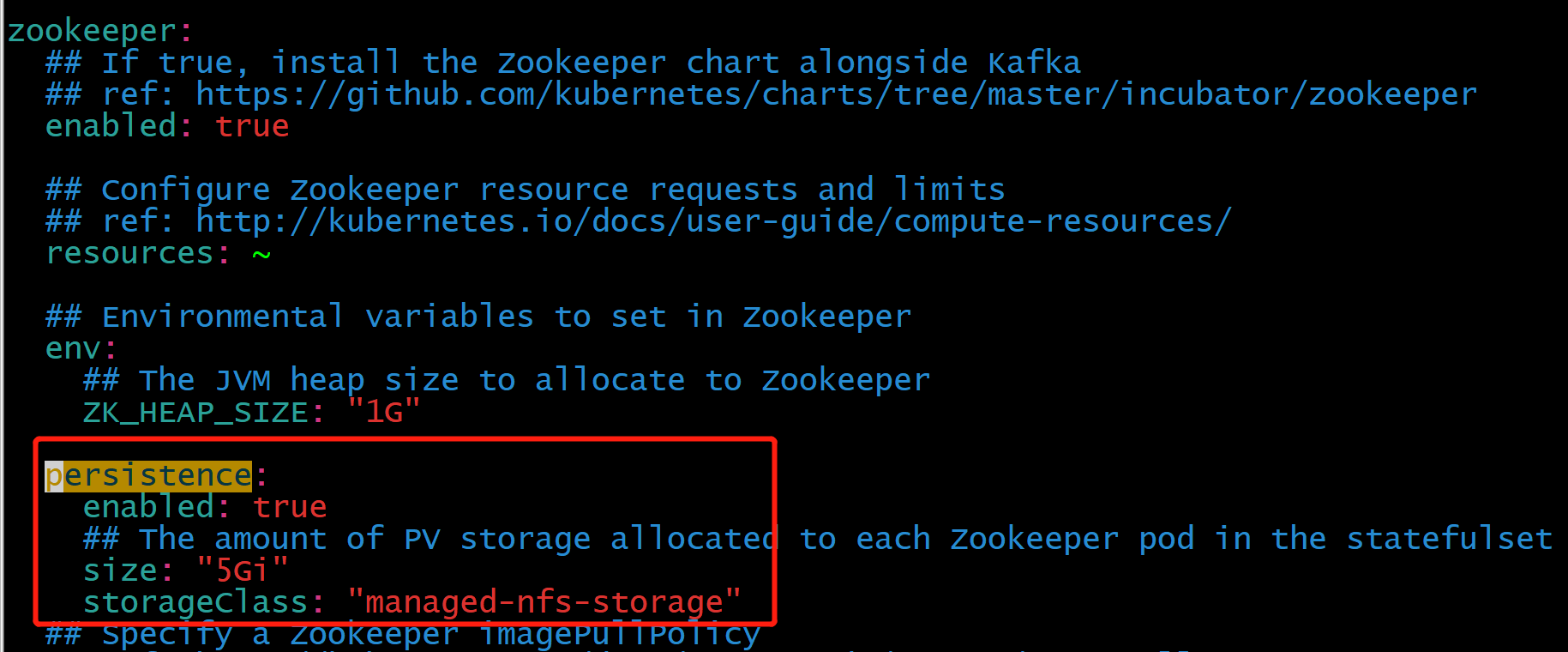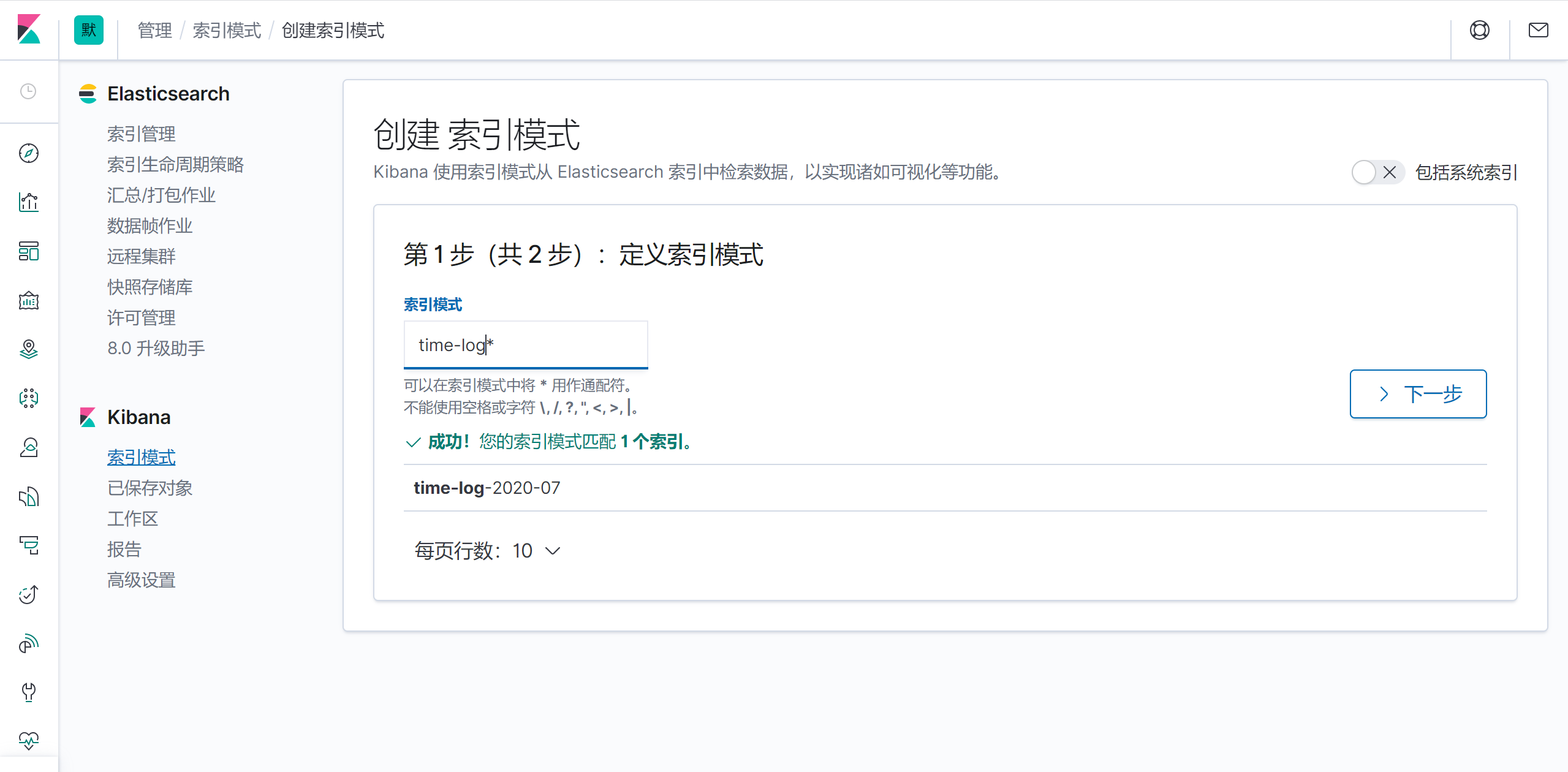k8s部署elk+kafka+filebeat
环境配置
| 服务 | 用途 | 版本 |
|---|---|---|
| elasticsearch | 存储+搜索 | 7.6.2 |
| filebeat | 日志收集 | 7.6.2 |
| logstash | 过滤筛选 | 7.3.1 |
| kibana | 图形化展示 | 7.6.2 |
| kafka | 消息中间件 | 2.4 |
elk kafkafilebeat架构图:

filebeat部署
在日志服务器部署filebeat7.6.2
#下载
[root@elk ~]# wget https://repo.huaweicloud.com/filebeat/7.6.2/filebeat-7.6.2-x86_64.rpm
#安装filebeat
[root@elk ~]# rpm -ivh filebeat-7.6.2-x86_64.rpm
#修改配置文件(根据实际情况)
[root@elk ~]# cat /etc/filebeat/filebeat.yml
filebeat.inputs:
- type: log
enabled: true
paths:
- /var/log/test.log
fields:
level: info
log_source: ["time-log"]
#可以配置多个path
setup.template.settings:
index.number_of_shards: 50
close_older: 72h
ignore_older: 72h
scan_frequency: 3s
output.kafka:
enabled: true
#host为kafka集群地址
hosts: ["192.168.50.205:31090", "192.168.50.205:31091", "192.168.50.205:31092"]
topic: axhome
required_acks: 1
kafka Zookeeper集群部署
本文采用helm部署,之前博客也有介绍statefulset部署kafka集群
#添加helm仓库(该仓库中有kafka)
[root@k8s01 home]# helm repo add incubator http://storage.googleapis.com/kubernetes-charts-incubator
#下载kafka的chart
[root@k8s01 home]# helm fetch incubator/kafka
#下载成功后当前目录有个压缩包kafka-0.21.2.tgz
[root@k8s01 home]# tar xf kafka-0.21.2.tgz
#进入解压后的kafka目录,编辑values.yaml文件
[root@k8s01 home]# cd kafka
[root@k8s01 kafka]# ls
charts containers.conf README.md requirements.yaml values.yaml
Chart.yaml OWNERS requirements.lock templates
下面是需要修改的地方:
首先要设置在K8S之外的也能使用kafka服务,修改external.enabled的值,改为true

找到configurationOverrides,下图两个红框中的内容原本是注释的,请删除注释符号,如果之前设置过跨网络访问kafka,就能理解下面写入K8S宿主机IP的原因了

接下来设置数据卷,找到persistence,按需要调整大小,再设置已准备好的storageclass的名称

再设置zookeeper的数据卷

修改完成后就可以部署kafka Zookeeoer集群
[root@k8s01 kafka]# helm install --name-template kafka -f values.yaml . --namespace test-env
#等待几分钟集群初始化后查看pod
[root@k8s01 kafka]# kubectl get -n test-env po
NAME READY STATUS RESTARTS AGE
kafka-0 1/1 Running 0 5h10m
kafka-1 1/1 Running 0 5h9m
kafka-2 1/1 Running 0 5h8m
kafka-zookeeper-0 1/1 Running 0 5h11m
kafka-zookeeper-1 1/1 Running 0 5h10m
kafka-zookeeper-2 1/1 Running 0 5h10m
[root@k8s01 kafka]# kubectl get -n test-env svc
NAME TYPE CLUSTER-IP EXTERNAL-IP PORT(S) AGE
kafka ClusterIP 10.111.207.146 <none> 9092/TCP 5h18m
kafka-0-external NodePort 10.97.107.169 <none> 19092:31090/TCP 5h18m
kafka-1-external NodePort 10.104.26.180 <none> 19092:31091/TCP 5h18m
kafka-2-external NodePort 10.99.233.249 <none> 19092:31092/TCP 5h18m
kafka-headless ClusterIP None <none> 9092/TCP 5h18m
kafka-zookeeper ClusterIP 10.109.8.126 <none> 2181/TCP 5h18m
kafka-zookeeper-headless ClusterIP None <none> 2181/TCP,3888/TCP,2888/TCP 5h18m
部署logstash
首先部署logstah配置文件
[root@k8s01 config]# cat config/containers.conf
input {
kafka {
bootstrap_servers => "192.168.50.205:31090,192.168.50.205:31091,192.168.50.205:31092"
topics => "axhome"
codec => json
}
}
output {
elasticsearch {
hosts => ["http://192.168.50.205:30023"]
index => "%{[fields][log_source]}-%{+YYYY-MM}"
}
}
[root@k8s01 elk]# kubectl create cm logstash-conf --from-file=containers.conf -n test-env
configmap/logstash-conf created
然后部署logstah
[root@k8s01 elk]# vim logstash.yaml
apiVersion: extensions/v1beta1
kind: Deployment
metadata:
name: logstash
namespace: test-env
spec:
replicas: 1
selector:
matchLabels:
app: logstash
template:
metadata:
labels:
app: logstash
spec:
containers:
- name: logstash
image: elastic/logstash:7.3.1
volumeMounts:
- name: config
mountPath: /opt/logstash/config/containers.conf
subPath: containers.conf
command:
- "/bin/sh"
- "-c"
- "/opt/logstash/bin/logstash -f /opt/logstash/config/containers.conf"
volumes:
- name: config
configMap:
name: logstash-conf
---
apiVersion: v1
kind: Service
metadata:
labels:
app: logstash
name: logstash
namespace: test-env
spec:
ports:
- port: 8080
targetPort: 8080
selector:
app: logstash
type: ClusterIP
[root@k8s01 elk]# kubectl apply -f logstash.yaml
deployment.extensions/logstash created
service/logstash created
[root@k8s01 elk]# kubectl get -n test-env po|grep logstash
logstash-679cb9c998-hpt6w 1/1 Running 1 25s
部署es集群
[root@k8s01 elk]# vim es-statefulset.yaml
apiVersion: apps/v1
kind: StatefulSet
metadata:
name: es
namespace: test-env
spec:
serviceName: elasticsearch
replicas: 3
selector:
matchLabels:
app: elasticsearch
template:
metadata:
labels:
app: elasticsearch
spec:
initContainers:
- name: increase-vm-max-map
image: busybox
command: ["sysctl", "-w", "vm.max_map_count=262144"]
securityContext:
privileged: true
- name: increase-fd-ulimit
image: busybox
command: ["sh", "-c", "ulimit -n 65536"]
securityContext:
privileged: true
containers:
- name: elasticsearch
image: docker.elastic.co/elasticsearch/elasticsearch:7.6.2
ports:
- name: rest
containerPort: 9200
- name: inter
containerPort: 9300
resources:
limits:
cpu: 1000m
requests:
cpu: 1000m
volumeMounts:
- name: data
mountPath: /usr/share/elasticsearch/data
env:
- name: cluster.name
value: k8s-logs
- name: node.name
valueFrom:
fieldRef:
fieldPath: metadata.name
- name: cluster.initial_master_nodes
value: "es-0,es-1,es-2"
- name: discovery.zen.minimum_master_nodes
value: "2"
- name: discovery.seed_hosts
value: "elasticsearch"
- name: ES_JAVA_OPTS
value: "-Xms512m -Xmx512m"
- name: network.host
value: "0.0.0.0"
volumeClaimTemplates:
- metadata:
name: data
labels:
app: elasticsearch
spec:
accessModes: [ "ReadWriteOnce" ]
storageClassName: managed-nfs-storage
resources:
requests:
storage: 50Gi
---
kind: Service
apiVersion: v1
metadata:
name: elasticsearch
namespace: test-env
labels:
app: elasticsearch
spec:
selector:
app: elasticsearch
clusterIP: None
ports:
- port: 9200
name: rest
- port: 9300
name: inter-node
---
kind: Service
apiVersion: v1
metadata:
name: elasticsearch-client
namespace: test-env
labels:
app: elasticsearch
spec:
selector:
app: elasticsearch
ports:
- port: 9200
name: rest
nodePort: 30023
- port: 9300
name: inter-node
nodePort: 30024
type: NodePort
[root@k8s01 elk]# kubectl apply -f es-statefulset.yaml
statefulset.apps/es created
service/elasticsearch created
service/elasticsearch-client created
部署kibana
部署kibana配置文件
[root@k8s01 elk]# cat config/kibana.yml
server.port: 5601
server.host: 0.0.0.0
elasticsearch.hosts: ["http://192.168.50.205:30023:"]
kibana.index: ".kibana"
i18n.locale: "zh-CN"
[root@k8s01 elk]# kubectl create cm kibana-conf --from-file=config/kibana.yml -n test-env
configmap/kibana-conf created
部署kibana
[root@k8s-master elk]# vim kibana.yaml
apiVersion: v1
kind: Service
metadata:
name: kibana
namespace: test-env
labels:
app: kibana
spec:
ports:
- port: 5601
nodePort: 30561
type: NodePort
selector:
app: kibana
---
apiVersion: apps/v1
kind: Deployment
metadata:
name: kibana
namespace: test-env
labels:
app: kibana
spec:
selector:
matchLabels:
app: kibana
template:
metadata:
labels:
app: kibana
spec:
containers:
- name: kibana
image: docker.elastic.co/kibana/kibana:7.6.2
env:
- name: ELASTICSEARCH_HOSTS
value: http://192.168.50.205:30023
ports:
- containerPort: 5601
volumeMounts:
- name: config
mountPath: /usr/share/kibana/config/kibana.yml
subPath: kibana.yml
volumes:
- name: config
configMap:
name: kibana-conf
[root@k8s01 elk]# kubectl apply -f kibana.yaml
service/kibana created
deployment.apps/kibana created
[root@k8s01 elk]# kubectl get -n test-env po|grep kibana
kibana-5565486fd4-4887b 1/1 Running 0 2m28s
打开kibana,查看并添加索引,部署完成

版权声明:
本站所有文章除特别声明外,均采用 CC BY-NC-SA 4.0 许可协议。转载请注明来自
爱吃可爱多!
喜欢就支持一下吧
打赏
 微信
微信
 支付宝
支付宝
 微信
微信
 支付宝
支付宝
